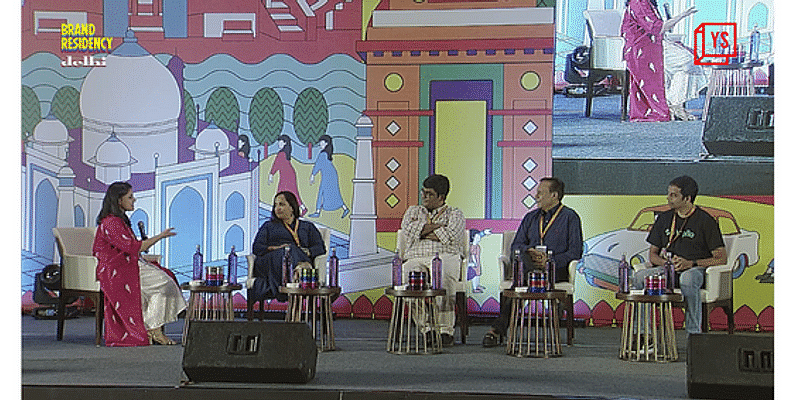From healthy toddler food to products catering to women’s intimate hygiene, to a wholesome milk brand standing tall in front of the industry giants – the Indian D2C market is flooded with never-seen-before products. Disrupting the Indian market in a positive way, the journey of these differentiative products has been full of challenges. However, with the right approach and market strategies, these startups have been successful in carving out their own niche.
Emerging D2C brands came together at YourStory’s ‘Brand Residency’ event to decode the importance of offering products that solve for market gaps and how they approached their respective spaces. The panel for ‘The differentiators: Product innovation’ featured Meghna Narayan, Co-founder, Slurrp Farm; Vikas Bagaria, Founder, Pee Safe; Chakradhar Gade, Co-founder, Country Delight; and Priy Ranjan, Co-founder and CEO, Shopflo.
Using tech to scale and grow
From the right promotions to targeting the appropriate consumer groups, tech has played a key role in making these ‘differentiators’ acceptable in the market. Companies like Shopflo helped brands in creating and retaining their custom groups by offering easy checkout solutions and empowering the new age of e-commerce.
“Only 30 percent of people coming to the website convert to shoppers. Shopflo works on reducing friction in the process of buying online, increasing intent of the customer and introducing consumer psychology workflows for brands to experiment with, and help drive incremental conversions,” explained Priy.
Starting their journey in 2013, Country Delight brought fresh, unadulterated milk directly to the customer’s doorstep and entered an industry that has been dominated for years by Indian milk giants. Taking technological aid from the very start, Country Delight has not only been successful in sustaining in the market, but also been able to create a bevy of loyal customers. “We figured out that tech is a key component that gives you advantage over large established players. And using tech you can scale business in ways that others don’t think is possible. In such a short time, we have five supply chains across the country because we think tech first in solving problems,” said Chakradhar.
Conveying the right message
Imparting knowledge about their product and its benefits is quite a challenge for most of these differentiators. Pee Safe’s Vikas shared how he was “surprised to know it’s the first such product in the whole world” when talking about his flagship product, a toilet seat sanitiser. Dealing in products like feminine hygiene and intimate wellness, it is imperative to find the right target group and keep the interaction going. “My team suggested that we target Gen-z as for them being healthy is a way of life. We still have a long way to go but happy to see that the young generation is talking about it,” he said.
Meghana faced similar issues in breaking stereotypes when they launched their products. A health food brand focussed on young children, Slurrp Farm was by default perceived as another packaged product instead of its healthy alternative. “There is a whole notion that packaged food is unhealthy, without seeing the logic through it. We used digital media to put our message across. We often show the whole process of manufacturing our products and how we use healthy alternatives for it,” she said.
Figuring out the niche
The access to multiple e-commerce channels along with a personal product specific website has made it easier for startups to come up with innovative products. But finding the right niche for a product still remains a challenge in this distinctive category of innovative products. “We selected our target group that falls between puberty to menopause. We had our vision set and kept coming up with products that could solve problems faced by this group,” shared Vikas.
For any D2C business to thrive, the journey does not end at acquiring customers rather it takes them to the next step that is retaining the said customers. This is where companies like Shopflo provide brands the much needed support and guidance. “You cannot build a relationship with a customer as a D2C brand by selling to them just once. Repeat customers should get special treatment, like a frictionless checkout experience and rewarded with benefits like membership points, cashbacks etc.” said Priy.
With brands giving customer experience utmost importance, innovating and presenting unique products and at the same time trying to educate the consumers about them, the future of differentiative D2C brands in India looks extremely promising in the near future.










